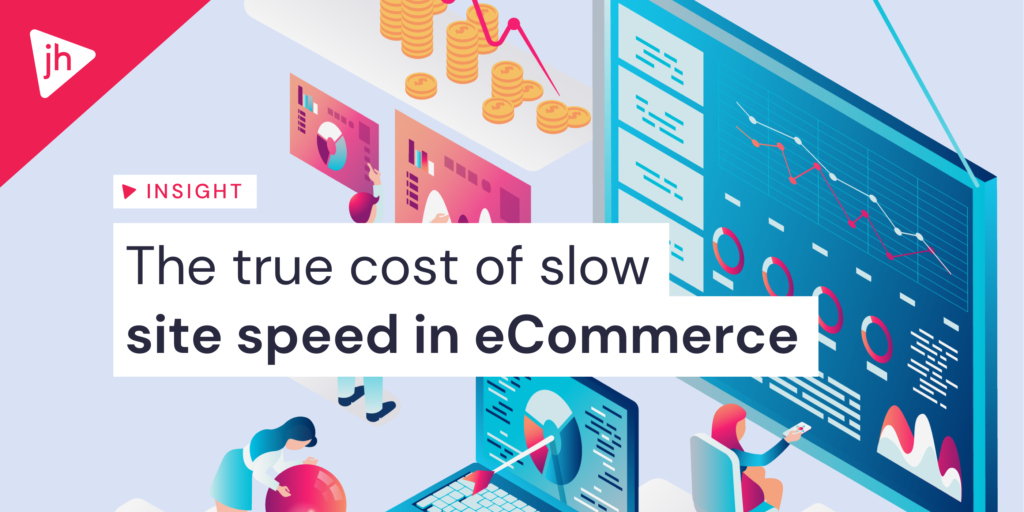The true cost of slow site speed in eCommerce
What is site speed costing your eCommerce business?
Most eCommerce merchants are aware that higher speed = higher conversions, yet still seem to place the performance optimisation required to improve this speed towards the bottom of their long list of priorities.
The bad news is – site speed is about to become more important than ever before, and to keep up, you’re probably going to have to do something about it… Which could be quite expensive. The good news? Well, you’re reading this article, which is definitely a great start.

What is performance optimisation, and how does it relate to site speed?
Put simply – performance optimisation is a range of tactics that improve website speed. There’s a lot of technical stuff in the background, but essentially it’s granular way to measure how quickly your site manages to do three important things:
“The first ten things I’d do to improve a user’s experience on a merchant’s website – is to improve its speed.”
– Joseph Russell, JH’s Director of Strategy
- Display your content to customers
- Make interactive content usable
- Deliver a smooth experience
When working to improve your site speed, everything you do is to improve (or speed up) one or more of these things.
Not sure how your site measures up? You can run a test for yourself in less than 5 minutes.
The way performance is measured is technical, but like many things in the digital space, really it’s about providing a great experience to your end user. Customers want to be able to get into your site immediately, start navigating and using it quickly, and they don’t want content to jump around – making them click on things they didn’t mean to. (That’s probably the most frustrating one of all.)
What does slow site speed cost an eCommerce business?
A note on site speed metrics – every device and connection is different, so just because your site seems to load immediately on your laptop, that doesn’t automatically mean it will have a great speed score. Google’s Lighthouse (which powers part of the speed report) bases it’s test on a Nexus X5 smartphone using a 3G connection, which might give a very different result than your iPhone connected to the wifi.
Site speed is far from a vanity metric. New studies from Google have found that rising customer expectations, as well as increased usage of smartphone devices for shopping are amplifying the need for speed across mobile and desktop. Research shows that if an eCommerce site takes 5 seconds to load, 38% of users have bounced by then. By 10 seconds, it’s jumped to 65%.
It’s not just about getting customers to stay on your website, either – site speed directly affects conversion rates. Studies have shown that pages loading within 2.4 seconds have a healthy 1.9% conversion rate – but when pages take 5.7 seconds or longer to load, that conversion rate drops way down to below 0.6%. Conversion rates are higher or lower depending on your industry, the type of page, and the amount of traffic – but no matter your situation, overall site performance will have an effect on them.
And if those two points aren’t enough to have you quaking in your boots, we’re now learning that Google is incorporating Core Web Vitals into its search ranking algorithm. Put simply – starting from May 2021, slow site speed is now going to affect your search rankings. All that hard work and investment you’ve put into developing SEO for your site could largely be undone if you haven’t also been investing in performance too.

What can I do about slow site speed for my eCommerce site?
While there is a lot of advice that’d be useful to most eCommerce merchants, with so many different platforms, ecosystems and industries out there, there’s not a one-size-fits-all approach. Some merchants might decide to start with something low-cost like simply optimizing images – while others might opt for an entire site rebuild using a PWA system. It really all depends on your budget and how far you want to go.
If you’re not happy with your site speed, it’s worth mentioning it to your current eCommerce agency – a good agency will be able to recommend areas you can invest in (or things to ditch) to improve your site’s overall speed, and tell you how much it’ll cost to implement them.
But that isn’t your only option. Whether you are looking to switch agencies entirely or just need someone to point you in the right direction, here at JH we can support you with everything from advice and consultancy to a full-blown site build. Get in touch with us to find out how we can help!